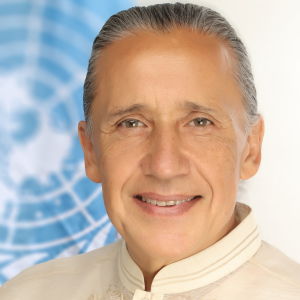Watch the video message
Good afternoon! Today we mark World Refugee Day. And I would like to honor -on behalf of the United Nations Country Team in the Philippines- the suffering, courage and resilience of millions of people around the world who have been forced to flee from their homes by violence and persecution.
We are once again commemorating World Refugee Day in the midst of a global pandemic.
And as we see, the coronavirus crisis continues to have an unprecedented impact on people around the world. But for those forcibly displaced, this crisis is hitting even harder in very specific areas:
Number 1, Employment and livelihood.
Before the pandemic, there was already a clear gap in employment rates between refugees and host populations in several countries. COVID-19 has made this worse. Only 1 in 10 working-age refugees is actively engaged in work, compared to 5 in 10 working-age nationals.
Number 2, Education.
In 5 of the 10 countries hosting the largest numbers of refugees, less than 20% of households have a computer at home.
Mobile internet access may offer the opportunity to access remote learning. But for refugees, this is often not feasible. Globally, 29 per cent of refugees have no phone at all.
Number 3, Food Security.
Displaced populations are generally more vulnerable to food insecurity and malnutrition. They often rely on food assistance and are often settling in displacement sites with limited access to basic services.
Worldwide, 80 per cent of displaced people are in areas affected by malnutrition and acute food insecurity.
Number 4, Social Protection.
Displaced populations, including some 85 per cent of the world’s refugees, are hosted primarily in low- and middle-income countries where social protection system coverage is modest or inexistant.
And even where national social protection systems exist, the inclusion of refugees is not always the norm.
So, it’s clear that the COVID-19 crisis continues to have a severe impact on refugees… They need our support.
The UN in the Philippines has just updated its Cooperation Framework with the country. We call it the Socioeconomic and Peacebuilding Framework for COVID-19 Recovery. This is our blueprint for addressing the most immediate challenges of the pandemic but also for achieving the Sustainable Development Goals and ensuring that no one is left behind.
In this context, for instance, UNHCR is working to ensure that refugees are not left behind in access to COVID-19 vaccines. In February 2020, UNHCR and Gavi, the Vaccine Alliance, signed a Memorandum of Understanding (MoU) so that refugees and other forcibly displaced people can access vaccines.
I have been privileged over the past year to witness demonstrations of mutual aid by Filipinos.
And today, on World Refugee Day, we are celebrating this Filipino culture of hospitality, especially to forcibly displaced people who have sought refuge and found home here in the Philippines.
I would like to commend the Philippines for championing the welfare of refugees.
I would like to mention the example of the financial contribution of the Government of the Philippines, last October, to provide life-saving assistance to Rohingya refugees. The financial contribution was announced as an obligation rooted in malasakit, a Filipino term that means “caring to the point of sharing the pain”.
Someone said that World Refugee Day is a reminder that there is no “us” and “them”. There is only “us”, one human family, connected in ways we sometimes forget.
So let’s keep active our memory and our solidarity with those sisters and brothers in search of protection and hope.




